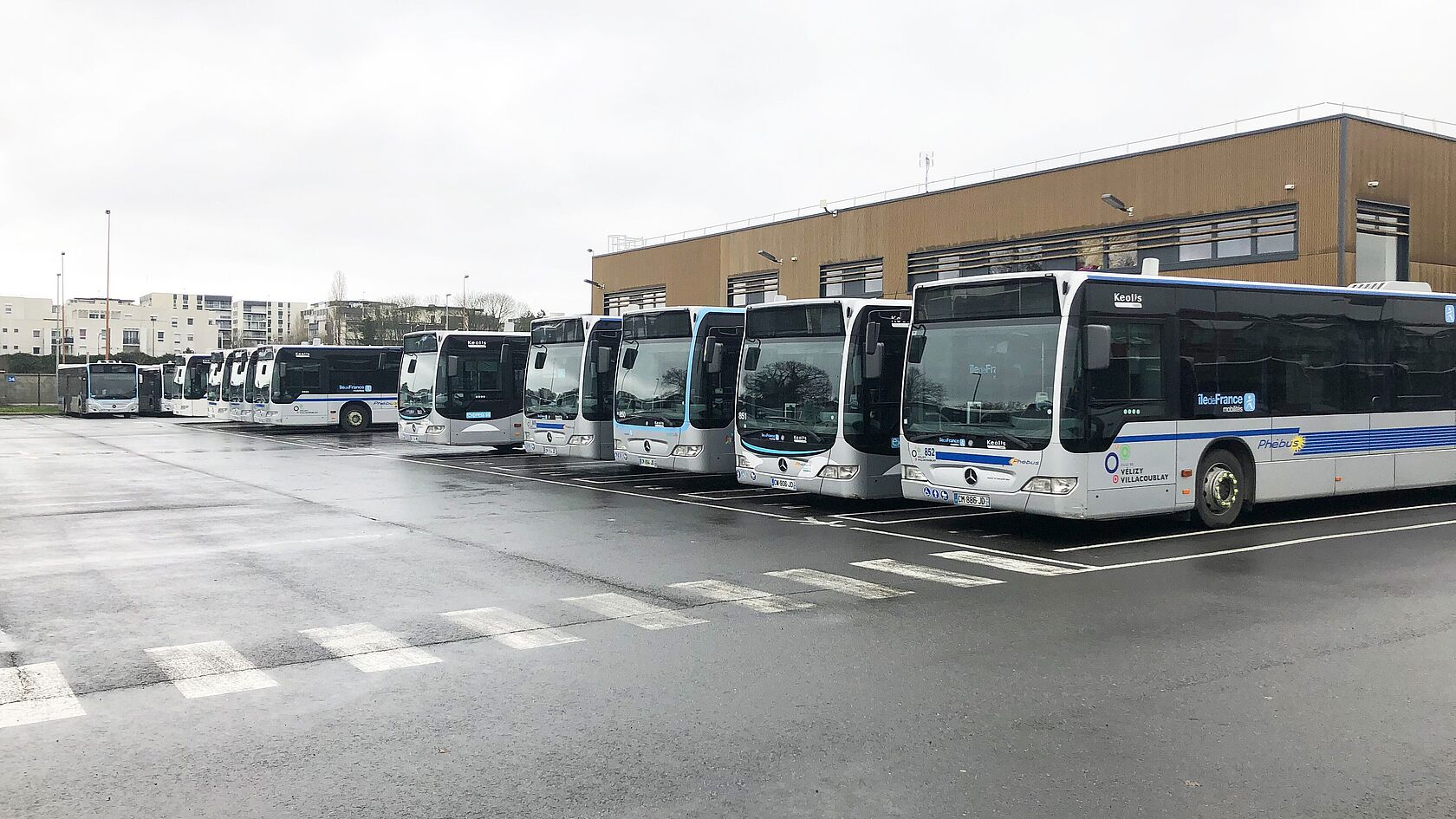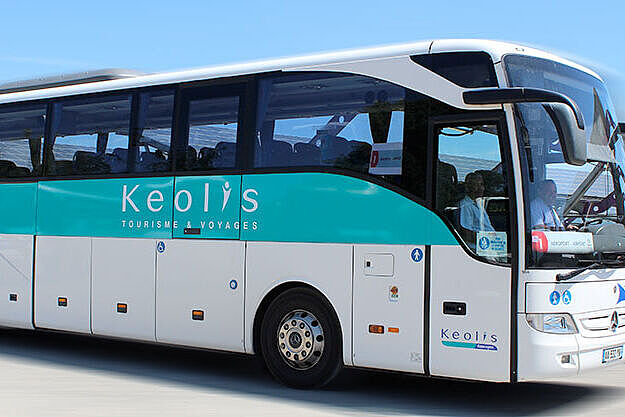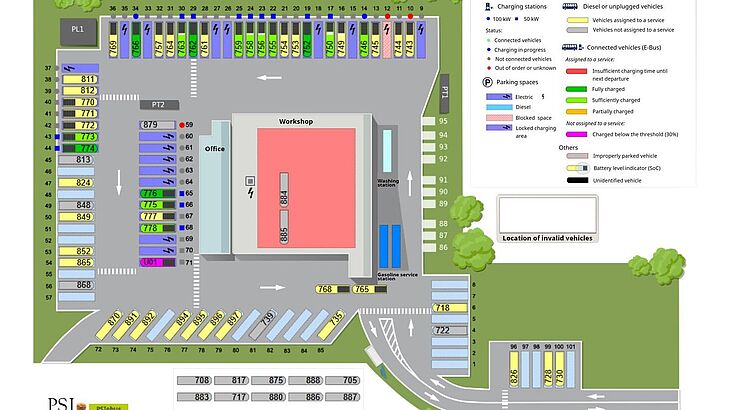
Case Study Keolis relies on PSIebus for electromobility
Keolis SA is gradually converting the Vélizy depot to electric drive with PSIebus.
In the Île-de-France region, including Paris, a total of 5,000 electric buses are to be in operation by 2025. The french transport authority has already started the changeover and commissioned PSI with the depot and charging management system PSIebus.
About Keolis
Keolis S.A. is more than just a public transport operator - as an expert in multimodality, the company develops and operates safe, intelligent and sustainable mobility solutions. In 13 countries, 68,000 employees are working to accelerate the ecological transition and offer an attractive alternative to the private car.
Headquartered in Paris, the Keolis Group operates a public transport network on behalf of more than 300 transport authorities, carrying over three billion passengers a year. This network comprises around 452 km of metro lines, over 1,000 km of streetcar lines, 2,300 km of railroad lines and 23,000 buses, 4,500 of which are equipped with alternative drive systems.
passengers per year
of which more than 4,500 with alternative drive systems
work at Keolis S.A.
Challenges
The conversion of a bus depot to an electric bus fleet brings with it various technical and logistical challenges that had to be overcome in the project.
Challenges: Technical and logistical hurdles
One of the biggest challenges was to integrate the various technical systems in order to ensure smooth operation. This included integrating the OKAPI vehicle deployment planning system and the timetable data from the HASTUS system into the PSIebus system.
In addition, the specific charging requirements of the electric buses, which are influenced by the weather conditions, had to be taken into account. PSIebus uses not only the route length but also weather reports to forecast the range of the vehicles more accurately and optimize the charging processes.
Another challenge was the remote introduction of the system due to delays in construction work and the delivery of buses and charging points caused by the coronavirus pandemic. Despite these difficulties, a successful remote rollout was carried out and is now considered a model for the future.

Objectives
Keolis SA, one of the leading public transport operators in France, aims to gradually convert its fleet to electric operation. This is part of a broader plan by the regional transport authority Île-de-France Mobilité to make public transport in and around Paris more environmentally friendly and efficient.
Sustainable mobility by 2025
By 2025, 5,000 environmentally friendly and quiet large buses are to be in use in the Île-de-France region.
Keolis was given the task of converting the Vélizy bus depot to an electric bus fleet. This requires an efficient depot and charging management system that takes into account the special requirements of electric vehicles and optimizes their use.

Solution approach
To enable and optimize the switch to electric operation, PSI was commissioned to implement a customized PSIebus depot and charging management system.
The solution: PSIebus as a key technology
PSIebus, PSI's depot and charging management system, was selected as the solution. This system ensures that the electric buses are parked and charged as needed. It integrates the OKAPI vehicle deployment planning and links it with timetable data from the HASTUS timetable system to determine the actual charging requirements.
The depot and charging management system takes into account not only the length of the route but also weather conditions that can affect the range of the vehicles, thus optimizing the charging processes. A positioning system detects the buses as they enter the depot and assigns them to a charging station depending on their charge status and the next round of the route.
Software used
The comprehensive components and systems enable flexible and efficient charging of electric buses, ensure continuous monitoring and adaptation of the charging process, and contribute to optimized use of the infrastructure.
- Depot and charging management system: PSIebus
- Charging stations: 50 KW and 100 KW
- Manufacturer: IES Synergy
- Transformers and construction work: Spie batignolles énergie
- Vehicle deployment planning: OKAPI
- Timetable system: HASTUS
The implementation
The practical implementation of the project required close cooperation between various actors and the consideration of specific technical and logistical challenges.
Efficient integration and remote implementation
When the electric buses enter the depot, they are detected by a tracking system. Depending on their charge status and the next round, they are assigned to one of the 50 kW or 100 kW charging stations. The battery management system adjusts the charging power individually to the battery's condition. An integrated chsarging management system monitors the energy demand and prevents the depot from being overloaded.
Due to the corona pandemic, construction work was temporarily interrupted, which made it necessary to introduce the system remotely.
Significant advantages for the company
- Vehicle parking and charging management from a single source
- Parallel operation of vehicles with all types of drive
- Increased vehicle availability
- Reduction of the vehicle reserve
- Optimized vehicle supply
- Optimal utilization of the charging infrastructure
- Scalable and cloud-ready
- Integrated quality management (reporting)
Conclusion
The project to convert the Vélizy bus depot to an electric bus fleet shows how modern technology and efficient management can work together to make public transport more sustainable. The implementation of PSIebus has enabled Keolis to optimize the operation of its electric buses and maximize the availability of the vehicles. Despite pandemic-related challenges, the project was successfully completed. The combination of innovative software and a high-performance charging infrastructure has shown that the future of public transport can be made environmentally friendly and efficient.


